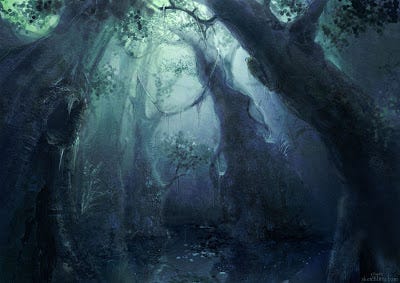The dolorous forest of humanity
This is from the end of the Introduction to Felix Holt: The Radical, by George Eliot. Isn’t it just an intriguingly and sinisterly luring beginning? It makes me shiver.
For there is seldom any wrong-doing which does not carry along with it some downfall of blindly-climbing hopes, some hard entail of suffering, some quickly-satiated desire that survives, with the life in death of old paralytic vice, to see itself cursed by its woeful progeny – some tragic mark of kinship in the one brief life to the far-stretching life that went before, and to the life that is to come after, such as has raised the pity and terror of men ever since they began to discern between will and destiny. But these things are often unknown to the world; for there is much pain that is quite noiseless; and vibrations that make human agonies are often a mere whisper in the roar of hurrying existence. There are glances of hatred that stab and raise no cry of murder; robberies that leave man or woman for ever beggared of peace and joy, yet kept secret by the sufferer – committed to no sound except that of low moans in the night, seen in no writing except that made on the face by the slow months of suppressed anguish and early morning tears. Many an inherited sorrow that has marred a life has been breathed into no human ear.
The poets have told us of a dolorous enchanted forest in the under world [Dante’s Inferno and Virgil's Aeneid]. The thorn-bushes there, and the thick-barked stems, have human histories hidden in them; the power of unuttered cries dwells in the passionless-seeming branches, and the red warm blood is darkly feeding the quivering nerves of a sleepless memory that watches through all dreams. These things are a parable.

Picture from here.

